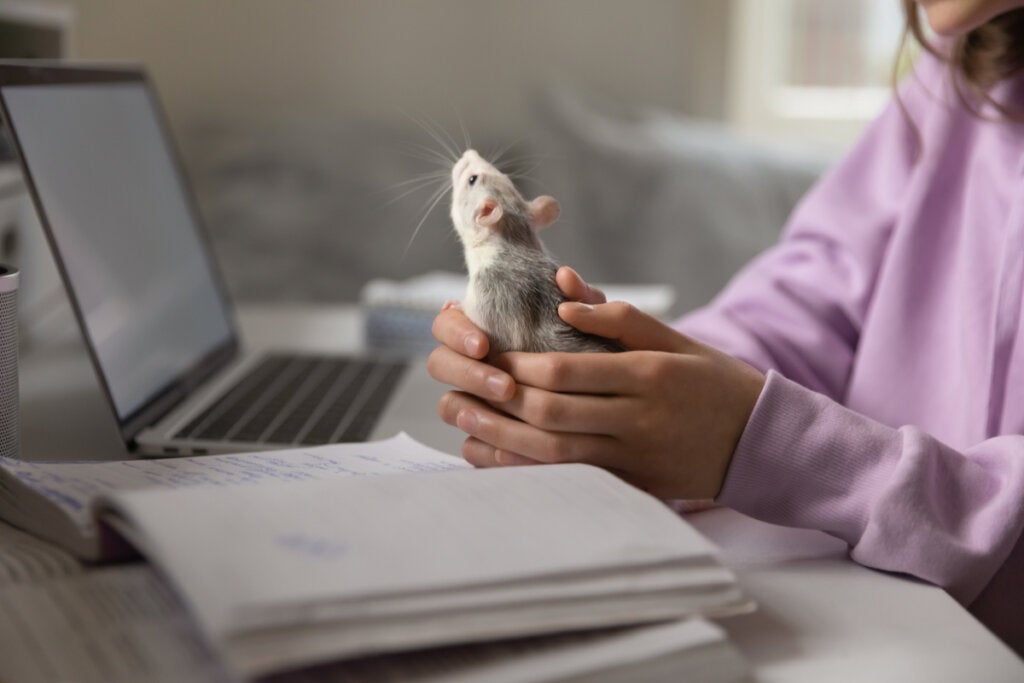Making people laugh requires a high cognitive level. Therefore, you’d probably expect the question of whether animals have a sense of humor to be viewed with a certain amount of skepticism. However, laughing, along with the ability to produce laughter in others, or laugh at the expense of others, has been evidenced in several species.
As a matter of fact, several studies support the idea that we’re not the only ones with the ability to set in motion certain mental mechanisms. Those which we may well have mistakenly believed were exclusive to humans. Laughing is one such mechanism. Furthermore, there’s a positive side to understanding how animals do it. It helps us understand how we humans do it.
The first step in discovering mental processes in animals is to decide how each process should be defined. Therefore, we ask the question, what exactly are humor and laughter? Then, we’ll review the findings that have been made to-date regarding animals and a sense of humor.
Sense of humor
Many animals possess the ability “to laugh” as a reaction to certain positive social situations for them. In other words, they show emotional expressions. For example, the panting of a gorilla or the wagging of a dog’s tail. These are associated with play or social interaction.
However, what does humor consist of? What makes a scenario funny instead of just pleasant or agreeable? Below, we talk about the two most complete approaches to the explanation of this phenomenon and its minimum requirements.
Theory of incongruity
This is the most common theory for explaining humor. Its main premise is that humor is the result of the identification of an inconsistency between expectation and reality. For instance, think of a joke. It’s a story that points to a conclusion but ends in a different and surprising way. That’s why it’s comical.
This theory suggests that humor involves the ability to identify inconsistencies. Although it’s difficult to demonstrate in certain species, it’s been documented in large primates capable of understanding sign language.
Benign rape theory
This theory goes beyond the idea of an inconsistency between expectation and result. It claims that humor appears in situations in which the well-being, identity, or normative belief system of the individual is threatened.
These situations, although it seems paradoxical, have the consent of the person. This theory works well to explain the phenomenon of tickling. In this instance, one person doesn’t respect the other’s personal space and establishes physical contact in sensitive areas. It’s an approach without bad intentions, it surprises the victim, and it’s funny – even if they want to get away from it as soon as possible. Furthermore, it’s impossible to tickle yourself.
Sense of humor in animals
On the basis of some of these theories, animals can indeed, have a sense of humor. However, at the moment it’s only been demonstrated in some species.
You might imagine these would be the great apes. Indeed, although they were the forerunners, in recent years, other species, far removed from humans, have been found to possess a sense of humor. Read on to find out more.
Koko the gorilla
Koko (1971-2018) was a gorilla kept in captivity for behavioral studies. Her intelligence opened the doors to understanding the minds of non-humans, especially in the area of language acquisition.
Koko was able to articulate and understand more than 1,000 concepts in American Sign Language. In addition, she could understand more than 2,000 words in spoken English.
Gorillas laugh, although it’s actually more of a gasp. Nevertheless, it allows us to understand when the animal finds something funny. This was the case with Koko. In fact, she played a game by changing words to confuse her researchers. Then, she would burst out laughing.
The dogs of Spokane
In the Spokane Animal Protection Service (United States) they noticed that dogs emitted a different type of growl when they played with each other. They decided to record these growls and study them further.
To see if the sound produced a significant response in the dogs, they played the same growl through the loudspeakers of the shelter. The result was surprising. The dogs calmed down, wagged their tails, and enjoyed playing.
Washoe, the chimpanzee
Washoe (1965-2007) was another of the primates studied in captivity in order to delve into the foundation of human behavior. Like Koko, her mastery of sign language was key to considering these animals as non-human persons.
However, Washoe’s jokes were less innocent than Koko’s. In fact, one of the anecdotes that her caregiver told is that, after urinating on her back, the chimpanzee made the gesture corresponding to “amused” when she saw that she’d turned round to scold her.
Laughing rats
Rats have been around humans for a long time. However, the stigma attached to them has meant that almost no one has taken an interest in their emotionality and their social relationships. For those who love these rodents, the difficulty is, that most of the sounds they make aren’t audible to humans.
However, in 2016, a study came to light in the journal, Nature, in which rats were filmed laughing as they played with each other and with experimenters. Indeed, it seems that these animals have a sense of humor, emitting 50 kHz sounds in social playing situations. Furthermore, as if that weren’t enough, they’re also ticklish.

Much remains to be learned from our planet mates. Luckily, science is continually advancing and shows us that, as humans, we’re certainly not unique in our feelings and our thinking. As a matter of fact, where previously, only humans were capable of processing the world as it is, now we know that insects feel pain, that rats laugh, and that apes speak. What other things might there be to discover?
The post Do Animals Have a Sense of Humor? Science Says Yes appeared first on Exploring your mind.



















Comments